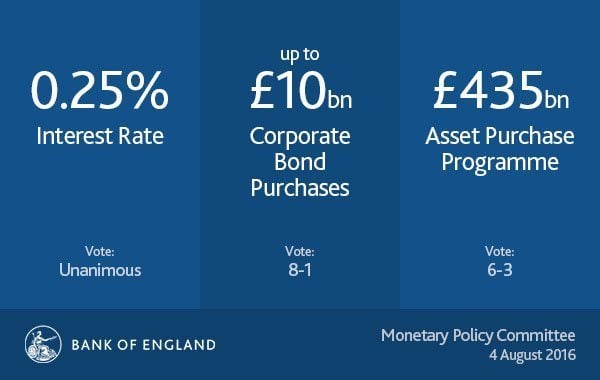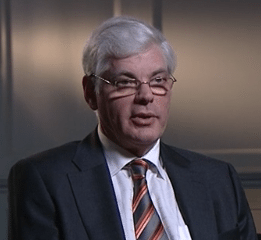
The Bank of England (BoE) has cut its benchmark rate by 0.25% – the first time in 7 years. The pound quickly moved lower reacting to the announcement. The move was telegraphed several weeks back in reaction to Brexit fallout. The interest rate cut was paired with some quantitive easing – all designed to stimulate economic growth as the UK economy slows and questions linger as to the ramifications of the UK departing Europe. The Monetary Policy Committee (MPC) released a statement alongside the rate cut;
“Following the United Kingdom’s vote to leave the European Union, the exchange rate has fallen and the outlook for growth in the short to medium term has weakened markedly. The fall in sterling is likely to push up on CPI inflation in the near term, hastening its return to the 2% target and probably causing it to rise above the target in the latter part of the MPC’s forecast period, before the exchange rate effect dissipates thereafter. In the real economy, although the weaker medium-term outlook for activity largely reflects a downward revision to the economy’s supply capacity, near-term weakness in demand is likely to open up a margin of spare capacity, including an eventual rise in unemployment. Consistent with this, recent surveys of business activity, confidence and optimism suggest that the United Kingdom is likely to see little growth in GDP in the second half of this year.”
 The MPC members agreed that a stimulus was necessary. A “New Term Funding Scheme” (TFS) was revealed that included the purchase of up to £10 billion of UK corporate bonds and an expansion of the asset purchase scheme for UK government bonds of £60 billion, taking the total stock of these asset purchases to £435 billion. The MPC said these three elements will be financed by the issuance of central bank reserves. All MPC members agreed that stimulus was warranted at this time, and that Bank Rate should be reduced to 0.25% and be supported by a TFS. Eight members supported the introduction of a corporate bond scheme, and six members supported further purchases of UK government bonds.
The MPC members agreed that a stimulus was necessary. A “New Term Funding Scheme” (TFS) was revealed that included the purchase of up to £10 billion of UK corporate bonds and an expansion of the asset purchase scheme for UK government bonds of £60 billion, taking the total stock of these asset purchases to £435 billion. The MPC said these three elements will be financed by the issuance of central bank reserves. All MPC members agreed that stimulus was warranted at this time, and that Bank Rate should be reduced to 0.25% and be supported by a TFS. Eight members supported the introduction of a corporate bond scheme, and six members supported further purchases of UK government bonds.
— Bank of England (@bankofengland) August 4, 2016
Leaders of the alternative finance community were quick to respond the Bank of England’s actions;
 Gonçalo de Vasconcelos, CEO and co-founder of SyndicateRoom, stated investors would seek out alternative investments:
Gonçalo de Vasconcelos, CEO and co-founder of SyndicateRoom, stated investors would seek out alternative investments:
“In today’s economic environment where interest rates are at record lows, there is a greater need than ever for UK investors to seek alternative routes to returns on their investments. Britain is a nation of savers and investors and for individual investors, today’s decision may be seen as another blow to expectations for household financial planning. It makes it even clearer that alternative investments offer the opportunity for long-term financial gains.”
 Kevin Caley, founder and Chairman of P2P lender ThinCats reflected on the interest rate announcement saying it would help business;
Kevin Caley, founder and Chairman of P2P lender ThinCats reflected on the interest rate announcement saying it would help business;
“By dropping interest rates to 0.25%, the Bank of England is attempting to stimulate the economy and the move will be welcomed by businesses in need of funding to grow and UK exporters who could benefit from a further weakening of the pound. But a base rate cut can only feel like a further tax for the millions of people who rely on interest from their savings and pension investments. Monetary policy is a useful tool, but unless the Government can find a way of achieving meaningful economic growth, we are likely to be in this situation for many more years.”
 Angus Dent, CEO of business “crowdlender” ArchOver, called the move an act of “no confidence”;
Angus Dent, CEO of business “crowdlender” ArchOver, called the move an act of “no confidence”;
“While this reduction may seem a good idea in some respects, the move to stimulate the market to borrow more and save less sends a strong message of ‘no confidence,'” said Dent. “Any SME considering raising money is unlikely to be swayed by a cut of 0.25% when rates are already at historic lows. If anything, they will interpret the move as one that creates uncertainty and supports the view that the UK is about to talk itself into recession after the Brexit vote. A more positive message might have been achieved by putting interest rates up.” He added: “It does mean, of course, that returns on offer from P2P platforms like ArchOver might become even more attractive to lenders, but you still need good quality borrowers to provide the projects to lend against.”
 Peter Behrens, Chief Commercial Officer and co-founder at P2P lending platform RateSetter, called the act almost inconceivable:
Peter Behrens, Chief Commercial Officer and co-founder at P2P lending platform RateSetter, called the act almost inconceivable:
“Only a few months ago, a further cut to the base rate was almost inconceivable, but here we are. This cut will further reduce returns on savings accounts which already pay very close to zero. Given this, it’s not surprising that peer to peer lending is increasing in popularity, as investors look for better returns in exchange for taking on some risk: we’ve had a hundred thousand new visits to our website in July alone.”
 Ian Thomas, co-founder and Director LendInvest, a commercial property marketplace lender, said;
Ian Thomas, co-founder and Director LendInvest, a commercial property marketplace lender, said;
“The fallout from Brexit could spell good news for professional and experienced property investors. If houses prices do cool as predicted, investing in property will become even more enticing, particularly if today’s rate cut translates into cheaper financing. Added to this, a protracted house price drop will likely deter some people from buying homes. But they will still need somewhere to live, providing a further boost to the landlord market.”
 Frazer Fearnhead, CEO of The House Crowd, added his voice that P2P lenders stand to gain from the rate cut;
Frazer Fearnhead, CEO of The House Crowd, added his voice that P2P lenders stand to gain from the rate cut;
“Interest rates are at their lowest for 300 years, and banks are offering little or negative interest on peoples’ savings. However, savers do have other options for their hard-earned cash. Newer investment models like crowdfunding can offer stronger returns – the traditional model of relying on banks to offer a decent interest on savings seems to be becoming a thing of the past.”
 Commenting on the interest rate cut and the launch of the TFS, Louise Beaumont, Head of Public Affairs & Marketing at GLI Finance stated;
Commenting on the interest rate cut and the launch of the TFS, Louise Beaumont, Head of Public Affairs & Marketing at GLI Finance stated;
“While the decision to introduce the Term Funding Scheme is a step forward in counteracting a further slowdown in bank lending to SMEs, there is unfortunately little precedent that it will make a difference. The Bank’s previous efforts, through the much maligned Funding for Lending Scheme, failed in its aims to incentivise banks and building societies to increase access to capital for SMEs with consistent reductions in net lending recorded. In the new post-Brexit normal, it is critical that more is done to raise awareness of alternative finance as a viable option for SMEs who seek finance in the face of further reductions in bank lending. SMEs are the lifeblood of the economy that can drive the UK’s growth during a period of heightened economic uncertainty and we must strive to create a better environment in which lack of available credit is no longer an issue”
“Alternative finance as an asset class can also offer an attractive proposition to institutional investors seeking returns in a low interest rate environment that is here to stay.”
Today we announced a Corporate Bond Purchase scheme worth up to £10bn #SuperThursday pic.twitter.com/xeAIb9yEud
— Bank of England (@bankofengland) August 4, 2016

